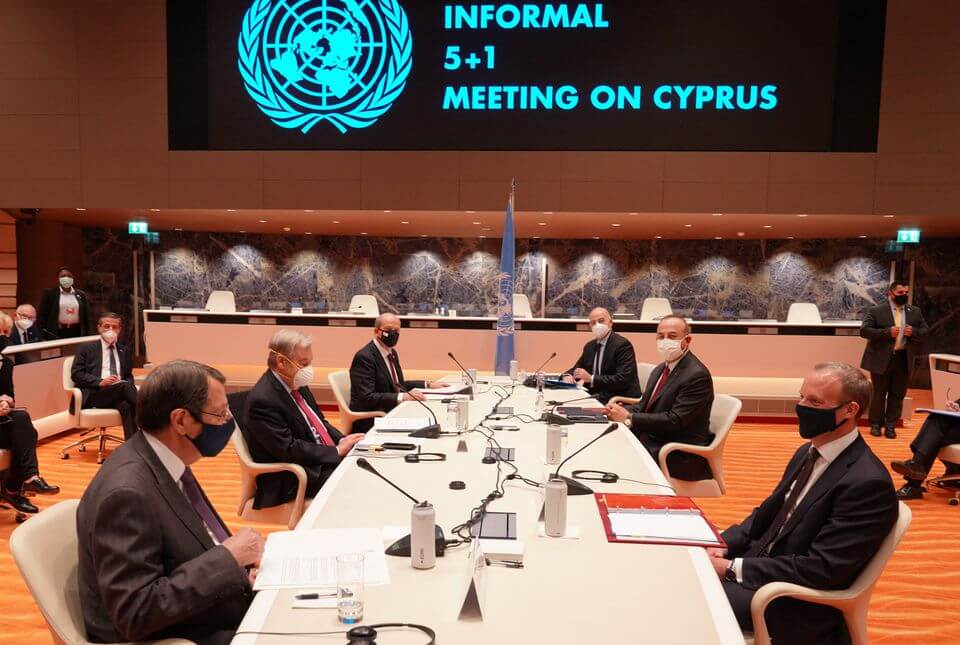On Thursday, talks between the Informal 5 (Turkish Republic of Northern Cyprus [TRNC], Cyprus, Turkey, Greece, and Britain) and the United Nations (UN) in Geneva concluded with Turkish Cyprus proposing a two-state solution to end the conflict with Cyprus. The Greek Cypriots, however, quickly rejected the plan.
The informal three-day discussions, aimed at finding a lasting solution to the decades-old dispute in Cyprus, were attended by the leaders of Northern and Greek administered Cyprus, Ersin Tatar and Nikos Anastasiades, respectively. The Foreign Ministers (FMs) of Turkey, Greece, and the United Kingdom (UK)—Mevlüt Çavuşoğlu, Nikos Dendias, and Dominic Raab—also participated in the UN-sponsored meeting held under the chairmanship of UN Secretary-General António Guterres.
The TRNC said that a two-state plan, which seeks to create two independent states side-by-side, is the only way to solve the conflict. The proposal calls for establishing a “cooperative relationship” between the two states “based on their inherent sovereign equality and equal international status” on the island. “Our perspective for resolution is the two-state model based on the principle of cooperation and coexistence of two sovereign states with equal rights,” said TRNC FM Tahsin Ertuğruloğlu. Turkish Cypriot leader Tatar told Reuters earlier this week that his proposal will bring a “new vision” to the talks and that it will allow “two sovereign states [to live] side-by-side in a good, neighbourly relationship, to cooperate in any way, to promote welfare for all Cypriots.”
The Republic of Cyprus, on the other hand, rejected the proposal, which they see as dividing Cyprus based on ethnic lines. Anastasiades said that the plan was a “great disappointment” and added that his side would present their own positions. Anastasiades also took to Twitter to say, “I assure our fellow citizens that we will continue to work with the same consistency to find a solution that will reunite our country, for the benefit of all Cypriots.” In this respect, the Greek Cypriots have proposed a “decentralised federation” based on an autonomous status for Greek and Turkish zones to manage their own affairs, which was dismissed by the TRNC as well as Turkey.
In response, Tatar said that it was pointless to hold talks with Cyprus without recognising his state. “This is an insult to Turkish Cypriots,” Tatar said. After the conclusion of the talks, Çavuşoğlu tweeted that Turkey “fully supported TRNC’s vision for a two-state solution based on sovereign equality.” He also said that Cyprus and Greece “did not bring a new vision and insisted on their outdated position.” The Turkish FM added that a “fair, permanent, and sustainable solution” could only be achieved “based on realities” on the island while explaining why a single state-federal solution would not be feasible.
Greece has consistently backed the Republic of Cyprus’ plan. Greek FM Nikos Dendias said that Athens hoped to create “conditions that would allow negotiations to resume within the framework explicitly set by the United Nations Security Council, namely that of a bizonal, bicommunal federation.” However, the FM said that “it was not possible to find common ground for the opening of negotiations in this context, due to the stance of the Turkish Cypriot and Turkish sides.”
UN Secretary-General Guterres also spoke of the difficulty of reaching an agreement given the parties’ conflicting demands and said that there was not enough common ground “to allow for the resumption of formal negotiations.” He added that the UN would make another attempt in “probably two or three months.”
The UK’s FM, Dominic Raab, said, “I urged flexibility on all sides to secure progress towards a just and lasting Cyprus settlement.” Raab also added that the UK “will continue to work with all parties” to seek a fair resolution.
The island nation of Cyprus is divided into the internationally recognised Republic of Cyprus in the south and Northern Cyprus, which is only recognised by Turkey. The two areas are separated by a UN buffer zone (known as the Green Line) to prevent further clashes. Turkey occupied the island in 1974 and has tried to expand its maritime claim using the borders of Northern Cyprus. Talks to resolve the decades-old dispute have failed to make any major breakthrough so far.
Turkish Cyprus Proposes Two-State Plan At UN Sponsored Talks in Geneva
Talks to end the dispute over Cyprus were held between the Informal 5 (Turkish Republic of Northern Cyprus [TRNC], Cyprus, Turkey, Greece, and Britain) and the United Nations (UN) in Geneva.
April 30, 2021

SOURCE: REUTERS
